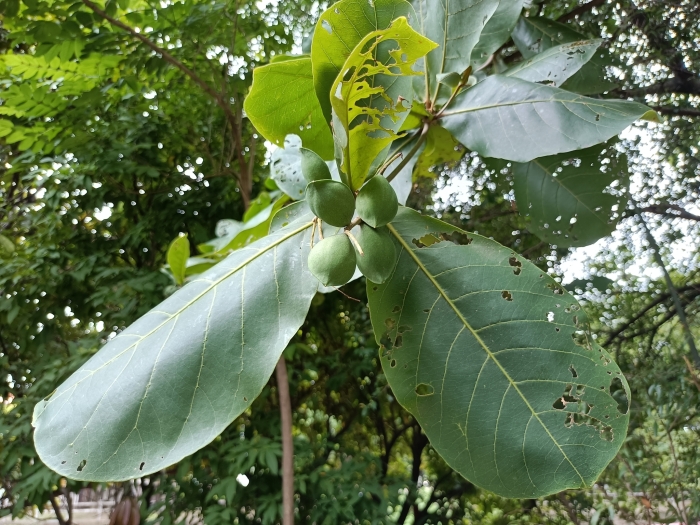Indian Almond
(Terminalia catappa)
Indian Almond (Terminalia catappa)
/
/

© 五色鳥
CC BY 4.0
Image By:
© 五色鳥
Recorded By:
Copyright:
CC BY 4.0
Copyright Notice:
Photo by: © 五色鳥 | License Type: CC BY 4.0 | License URL: http://creativecommons.org/licenses/by/4.0/ | Uploader: ssnp129 | Publisher: iNaturalist |




















Estimated Native Range
Summary
Terminalia catappa, commonly known as Indian almond or tropical almond, is a deciduous tree native to the broad-leaved evergreen forests of Asia, Australia, and the Pacific islands, as well as Madagascar and Seychelles. It can reach up to 115 feet in height, typically with a symmetrical, spreading crown and tiered branches that provide a distinctive silhouette. The leaves are large, leathery, and arranged in a rosette-like pattern, turning red to purple before falling. It produces small, inconspicuous white to greenish flowers, followed by edible, almond-shaped fruits that are green turning to yellow or red as they ripen. The seeds within are also edible and have a slightly acidic taste.
The Indian almond is valued for its shade-providing canopy, making it a popular choice for parks and large gardens in tropical and subtropical regions. It is also used as a street tree in urban areas. The tree is relatively easy to maintain, requiring well-drained soils and full sun to partial shade. It is drought-tolerant once established. However, it can be susceptible to root rot in poorly drained soils and may suffer from leaf spot diseases. In some regions, Terminalia catappa is considered potentially invasive due to its ability to spread aggressively outside its native range. Gardeners should consult local regulations before planting.CC BY-SA 4.0
The Indian almond is valued for its shade-providing canopy, making it a popular choice for parks and large gardens in tropical and subtropical regions. It is also used as a street tree in urban areas. The tree is relatively easy to maintain, requiring well-drained soils and full sun to partial shade. It is drought-tolerant once established. However, it can be susceptible to root rot in poorly drained soils and may suffer from leaf spot diseases. In some regions, Terminalia catappa is considered potentially invasive due to its ability to spread aggressively outside its native range. Gardeners should consult local regulations before planting.CC BY-SA 4.0
Plant Description
- Plant Type: Tree
- Height: 45-115 feet
- Width: 30-49 feet
- Growth Rate: Moderate, Rapid
- Flower Color: Green, White
- Flowering Season: Spring, Summer
- Leaf Retention: Deciduous
Growth Requirements
- Sun: Full Sun, Part Shade
- Water: Medium
- Drainage: Fast, Medium
Common Uses
Edible*Disclaimer: Easyscape's listed plant edibility is for informational use. Always verify the safety and proper identification of any plant before consumption., Low Maintenance
Natural Habitat
Broad-leaved evergreen forests of Asia, Australia, and the Pacific islands, as well as Madagascar and Seychelles
Other Names
Common Names: Indian Almond, Tropical Almond, Indischer Mandelbaum, Katappenbaum, Sea Almond
Scientific Names: , Terminalia catappa, Buceras catappa, Bucida buceras, Bucida buceras, Juglans catappa, Myrobalanus badamia, Myrobalanus catappa, Myrobalanus commersonii, Myrobalanus rubrigemmis
GBIF Accepted Name: